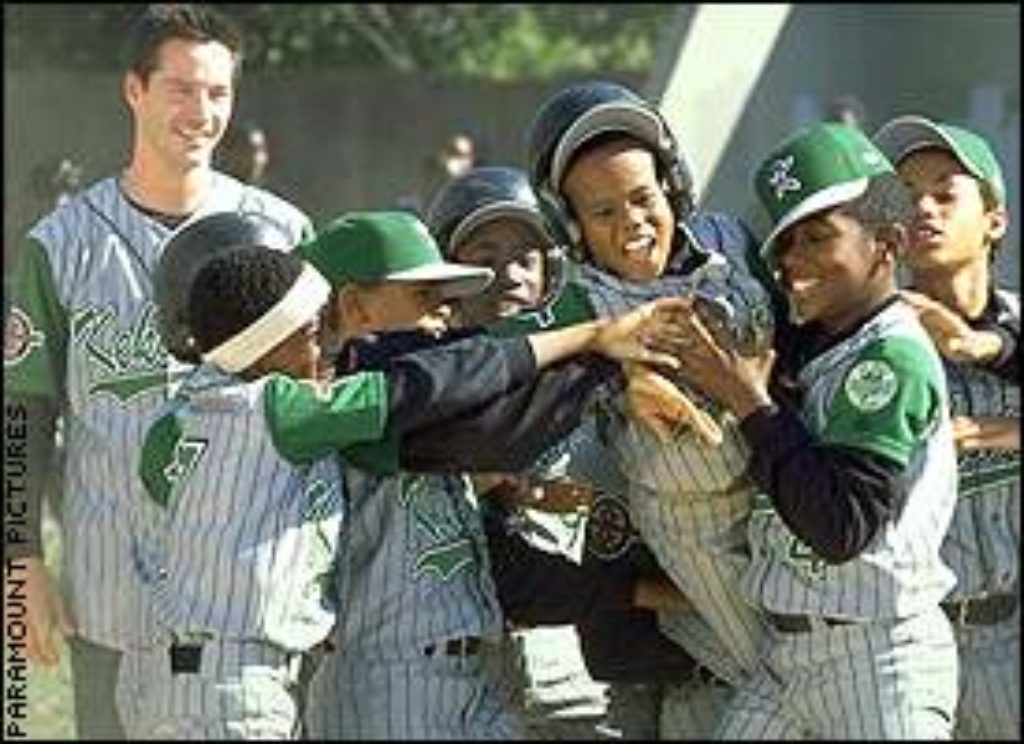
Hardball strikes out trying to depict the trials and inspirations of Chicago’s inner-city Near North Little League. It suffers from a classic case of “if-onlys.” If only the head-bobbing Keanu Reeves hadn’t been cast as Coach Conor. If only screenwriters had left out about 50 s-words, many of them uttered by preadolescents. If only director Brian Robbin (responsible for the vulgar teen romp Varsity Blues) hadn’t stripped the story, originally based on the life of a missionary, of its Christian ideals.
Chicagoan Conor O’Neill is up to his eyebrows in debt. And no consolidation loan is going to help him when his bookie shows up to break every bone in his body. Desperate to stay alive, he hits up old pal Jimmy Fleming for a loan. Jimmy won’t do it. What he will do is pay him $500 a week to coach a baseball team of 9- to 12-year-olds from the projects. Conor’s not keen on the idea, but his back is against the wall, so he accepts the deal. He figures he’ll just dump the kids once his life is out of hock. What he’s not prepared for is the powerful way 11 bratty kids will warm his soul and change his life.
positive elements: A season of hardball makes Conor grow up in many ways. [Spoiler Warning] He abandons gambling and realizes that his calling in life is to help kids. And he realizes that there’s more to life than self. Before the last game of the season he gathers the kids around him and thanks them for showing him what’s what. “One of the most important things in life is showing up,” he tells them. “I’m blown away by your ability to show up.”
spiritual content: A church funeral is punctuated by gospel singing.
sexual content: Great restraint is exercised here. Conor’s attraction to a school teacher generates no sexual sparks. At worst, he grins his way through a double entendre about “organizing physical activities.” Not overtly sexual, a scene involves Conor walking around his apartment wrapped only in a towel. What is very troubling, however, is a scene in which one of the kids taunts another by saying, “You suck, just like my girlfriend.”
violent content: A bar brawl culminates with Conor walking away with blood dripping from numerous wounds—some of them self-inflicted (“No one kicks my a– better than I do,” he inexplicably yells after smashing his fist and head through glass windows). Later, a couple other scenes have thugs beating him up for non-payment on gambling debts. Kids on the baseball field scuffle and fight (no injuries). One kid is beaten up by street gangsters and another is shot through the heart when he accidentally gets in the way of an intense gang-related shootout.
crude or profane language: How Hardball walked home with a PG-13 rating is a mystery. Close to 50 s-words emanate from the mouths of adults and children. Indeed, the kids’ favorite words are s— and b–ch. One also makes an obscene gesture. At least one f-word and handfuls of other profanities (including several abuses of Jesus’ name) add insult to injury.
drug and alcohol content: Conor smokes continuously. He’s also seen drinking on several occasions. Jimmy jokes about a spot where he and Conor used to buy marijuana.
other negative elements: While intended to make bigots look foolish, two comments may still be found offensive. One of Conor’s seedy friends jokes about Conor coaching the “crack babies.” And a bartender insinuates that Conor is wasting his life teaching “black kids” how to play baseball. A key song in the movie is Notorious B.I.G.’s “Big Poppa,” which, if listened to in its entirety, includes lyrics about oral sex and drug abuse. The team’s pitcher can’t pitch unless he’s being “soothed” by listening to the song on his headphones. Very little of the song is actually heard, but when the league takes away the boy’s headphone privileges, his teammates and fans sing parts of it aloud to him to help him concentrate.
conclusion: Loosely inspired by a book in which, according to the Chicago Tribune, author Daniel Coyle “focuses on a patient, good-natured coach identified only as Bill.” Reeve’s Conor is instead a ruinously compulsive gambler, brawler and mean-spirited lowlife. Those characteristics, reports the Tribune, “actually parallel the real life of league co-founder Bob Muzikowski, except that he is a self-described devout Christian who credits his faith for recovery from alcohol and drug addiction before he founded the league with African-American community organizer Al Carter.”
Muzikowski was so upset with preliminary scripts for Hardball that he and his fellow coaches actually visited the set to protest, among other things, the gratuitous foul language. Even Chicago Mayor Richard Daley and then-Chicago schools chief Paul Vallas made their displeasure known. It seems that between then and now, Keanu and crew did clean up parts of the film. Muzikowski’s early statements indicated that the scriptwriters included multiple uses of the f-word and a scene in which a white coach hits a black child. That scene and most of the f-words do not appear in the final print. But the troublesome content that’s left still decimates what could have been an amazing story.
